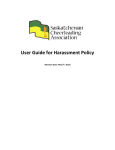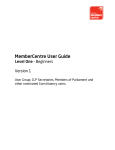Download family life course
Transcript
Family Life Course ”Other things may change us, but we start and end with the family” Anthony Brandt www.kent.gov.uk Contents Introduction ..................................................................................................... 4 • Welcome to the Family Life Course.............................................................. 4 • What is the Family Life Course for?.............................................................. 4 • How does it work?......................................................................................... 4 • Who can facilitate a Family Life Course?...................................................... 4 • How is Family Life different from other parent courses and programmes?... 4 • What does the course look like?................................................................... 5 • Setting up a parent group.............................................................................. 6 • How to use the manual................................................................................. 7 • Be Prepared.................................................................................................. 7 • Managing a group......................................................................................... 8 • Ice Breakers.................................................................................................. 9 • Welcome/Close Session............................................................................... 9 • Discussions................................................................................................... 10 • Evaluation..................................................................................................... 11 • Risky Areas................................................................................................... 12 Quotes about Family Life ............................................................................... 13 Session One ................................................................................................... 14 Session Two ................................................................................................... 23 Session Three ................................................................................................ 31 Session Four .................................................................................................. 39 Forms ............................................................................................................. 44 • Register......................................................................................................... 46 • Start and End Evaluations............................................................................. 47 • Equality & Diversity Monitoring Form............................................................ 50 Resource List ................................................................................................. 52 Kent County Council 3 Welcome to the Family Life course Family Life is a resource that can be used to run a four session parent course. All the information, factsheets, worksheets, activity guides and quizzes needed to run the course are provided in this manual. Throughout the manual the term parent is used to represent all carers of children, and the term ‘children’ is used to represent both children and young people. Please read through the whole manual before you set up a course. What is the Family Life course for? The aim of Family Life is to raise awareness of the importance of talking to children about growing up. When children are given accurate information and positive guidance from their parents, they develop the confidence to actively make informed and positive choices in their own lives. Open parental communication can significantly reduce risk taking behaviour in young people. It is difficult to open the doors of communication once a child has become an adolescent, whereas if communication is already taking place between child and parent, it is easier to keep the doors open. Family Life encourages parents to open those doors and maintain communication with their child while they are growing up. How does it work? The group explores the issues of Family Life in a relaxed, humorous and non-threatening environment. Development takes place through guided discussions, activities and worksheets. Each session is supported with relevant factsheets and recommended resources. Who can facilitate a Family Life course? Family Life is not an educational course and the core sessions do not need to be facilitated by professionals. Facilitators are ideally those working in Family Support with parents, whose work is overseen and managed by an organisation that can provide the following: • • • • • • Supervision Safe and appropriate venue Refreshments Risk Assessment Child Protection training and support Equality and Diversity awareness training How is Family Life different from other parent courses and programmes? Family Life is an informal, non-teaching course. Parents gain knowledge, confidence and new ideas through discussion with each other, and use of the worksheets. For input on parenting and dealing with childhood issues, parents should access a registered programme e.g. Incredible Years, Strengthening Families Strengthening Communities, Solihull, Freedom Programme or other. 4 Family Life Course What does the course look like? The course is designed to be delivered in 4 sessions of 2 hours each. Ideally these would be held once a week giving time for those taking part to absorb the topics discussed, although different structures of the course are also fine. It is often helpful to invite people along for a pre-course session, so that they can find out more about the course, get to know you and each other, and become familiar with the venue. Session Topic Pre-Course Welcome and Introduce the Family Life Course 1 Puberty & Growing Up 2 Talking to Children and Young People 3 Influences Pressures on Family Life 4 SRE in schools and at home Different elements of Family Life are explored and discussed in each session. It may be decided by the group that more information on Sexual Health would be useful. There are experts in the County who are willing to visit parent groups to talk about: • • • • Contraception Sexually Transmitted Infections Young People’s Sexual Health services Delaying Early Sexual Activity If the group would like this input, consider inviting a Sexual Health expert to the group. Parents welcome the opportunity to speak openly with a professional about issues that concern them, and Sexual Health experts have an abundance of resources and literature to demonstrate and share along with their knowledge and humour on this often difficult subject. Family Life has been designed as a 4 session course with each session complementing each other. However, individual sessions and resources can be pulled out and used in other contexts eg supporting a relevant topic within another group. Kent County Council 5 Setting up a parent group Things to consider before you begin: TIME: It takes time to prepare and run a course. If you are planning to run a weekly course during a school term, you will need to do your preparation, recruitment and sometimes your welcome session in the preceding term. This will allow the four sessions to fit comfortably within a school term. It is often hard to maintain a course that runs over a holiday. VENUE: You need a room that will be comfortable, welcoming and large enough for the group. Privacy is also important as parents may feel uncomfortable if there are interruptions (or children peering in at the window!). Consider any additional needs your parents may have, eg: disability. TIMING: A group needs to be held at a time accessible by the parents. This should be discussed with them. NUMBERS: Decide on the maximum number you can accommodate in your group. Also consider the minimum number you would need to deem the use of your time as viable. A guideline would be 4-10 if you are delivering alone and 6-12 if you have a co-facilitator. CO-FACILITATOR: Many facilitators feel more confident when delivering in pairs. It eases the pressure of being the only one in charge of a group and having to manage all the group dynamics alone. It can also be of huge benefit if issues arise in the group which require simultaneous attention, eg: small group work, coffee breaks, extra support for individuals. This is something that needs to be decided upon early in the planning. REFRESHMENTS: Adults attending courses expect a cup of tea or coffee at the very minimum. If more is offered it is usually welcomed with enthusiasm. A budget needs to be agreed to ensure facilitators are not out of pocket. ADVERTISING: If you are sending flyers to parents, these need to be approved by a manager to ensure they are acceptable to the organisation hosting the course. RECRUITMENT: Getting parents to come to a parenting course is always a challenge. Often once you have delivered a course, word gets around and future courses are easier to fill. Targeting individuals can be a successful ploy, parents who are enthusiastic and turn up for a variety of events can usually motivate others to join. Small sessions or coffee mornings can be used as introductions for courses, giving people a chance to discuss the course and get to know each other in advance. Extending the welcome to friends and neighbours of parents can also help those who feel shy of attending alone. MEN: Male role models are of vital importance to children and provide valuable support and information about growing up. Parenting courses tend to be largely attended by women, which can create an unwelcoming and even hostile environment for men. Facilitators need to make particular effort to encourage men to attend and ensure that the group treats them with warmth and equality. Try not to allow the group to make negative comments about men, this is nonproductive to Family Life and the facilitator could be seen to be condoning this attitude. 6 Family Life Course INCLUSIVITY: Family Life courses should be equally available to all carers of children, and the facilitator should ensure that the group are equally welcoming and accepting of foster parents, adoptive parents, grandparents, step-parents and partners. The facilitator should also make sure that all those who attend feel equally accepted in the group regardless of race, colour, language, disability or academic ability. HOW TO USE THE MANUAL It is important facilitators: • Read through the entire manual before starting • Are familiar with the session plans and resources • Are clear on the aims of each session Each session is designed to last for two hours (if you plan to include a break your sessions will be longer) and is laid out in the following way. SESSION AIMS: These detail what you are aiming to achieve during the session. SESSION PLAN: A timed plan of how to deliver the session. Each section details the topic, the method of delivering it and equipment suggestions. APPENDIX: This provides more detailed information for some of the activities mentioned in the session plan. WORKSHEETS/FACTSHEETS/QUIZZES: These are provided to support each session. They need to be photocopied either for use during the session or to be given as handouts. All factsheets include the web address from where they were sourced. RECOMMENDED RESOURCES: This is a list of resources that support the Family Life course. BE PREPARED: “Failing to prepare is preparing to fail” - Benjamin Franklin Being well prepared before the course starts will ensure several vital things: • • • • • • • • Facilitator knows what to do Arrangements go smoothly Facilitator has all resources to hand Parents feel comfortable and welcome Facilitator feels confident to deliver Parents feel secure that facilitator is in control Mishaps are more easily dealt with Less stress all round Kent County Council 7 Managing a group It can be stressful managing a group whether you have done it lots of times before or are setting one up for the first time (it can also be a lot of fun). Being well prepared will reduce a lot of the stress, but there are some things that only get easier with practise. Similarly those attending the group are often nervous. For some it may be the first group that they have attended, or they may have attended others that have made them feel uncomfortable or embarrassed. ENVIRONMENT: Make your room look as inviting and welcoming as possible. Think about placement of tables and chairs. Ensure parents know how to find the room and receptionists are aware of the group and its location. RESOURCES: These can be books, leaflets, DVDs, posters, local information, etc. There is frequent reference to these throughout the course. Try to gather some of these together and set them out for people to browse at leisure. Most people choose their own time to browse and some prefer to do so whilst others are arriving and leaving. GROUP AGREEMENT: It is important that all members feel safe within the group. In order to do so, an agreement should be made by all members and the facilitator of the code of conduct that will be adhered to by the group. As many of the topics that will be discussed are of a sensitive nature, and often quite personal, members need to feel secure that they are treated with respect. Use a piece of flipchart to note down the suggestions and encourage members to create their own group agreement. Try to adhere to what is suggested, but offer alternative wording if negative words are being used, eg: “Don’t gossip” could become “Respect others privacy”. The group agreement should be displayed throughout each session and referred to when necessary. If new members join the group they should be made aware of the agreement, as they may wish to add things themselves. Ensure that the following are included on the agreement in some form: • CONFIDENTIALITY – This means that the things discussed within the group that are personal, should not be discussed outside the group. It does not include the new ideas and learning, which are intended to be taken away. Encouraging people to “Tell the story, not the people” can help to remove the personal element, but when talking about Family Life, there will be a lot of personal exchange. Facilitators need to make group members aware, that if anything is discussed that causes concern that someone is either being hurt or threatened, or is at risk of being hurt or threatened, the facilitator has an obligation to take that further, but will not do so without discussing it with the individual first. • RESPECT - For each others differences and opinions. Everyone has had different experiences and upbringing and it is important to recognise that ‘difference’ does not mean ‘wrong’. It also means allowing each person time to speak and to express themselves. 8 Family Life Course • AGREE TO DISAGREE - The purpose of a discussion is to voice own views, hear others, broaden perspectives and develop ideas and opinions. These are not always going to match those of others and the group needs to acknowledge this and know that it is OK. • ONLY SHARE WHAT YOU FEEL COMFORTABLE SHARING - In a group setting where everyone is drawing on their own experiences, some people may feel under pressure to share more than they feel comfortable. Make sure they know that this is not expected of them. • NO SUCH THING AS A SILLY QUESTION - No-one knows everything and no-one likes to feel silly. Everyone can learn from each other. • ICE BREAKERS / WARM UPS - There are many different types of Ice Breakers that can be used to help people get to know each other and feel more relaxed in an unfamiliar environment. Most people find it hard mixing with strangers, so breaking the ice is useful, but can make people nervous if they feel they are being asked to do anything embarrassing. Later in the course, when the group is established, people are more willing to do livelier activities that take them outside their comfort zones, but in the early stages it is more important to make people feel comfortable. For each session a couple of ideas will be offered, but be creative and think of new ones. Typing ‘ice breaker’ or ‘party games’ into a search engine will provide you with a wealth of ideas that can be used or adapted. • WELCOME/CLOSE SESSION - Facilitators should be very clear when defining the beginning and end of a session. Allowing chatter to blur the edges will lose the credibility of the facilitator as a leader. Members should be welcomed at the beginning, a verbal outline of the session given, and a reminder of the group agreement. This will focus the group in readiness for the session. At the end the facilitator should summarise the key points covered in the session to help consolidate it. A reminder can be given about any factsheets or quizzes given out during the session. A brief verbal outline of the following session should also be given and parents should be thanked for attending. Kent County Council 9 Discussions Holding a discussion does not mean allowing people to just chat! A guided discussion has a purpose to it. By offering people some information, asking them to discuss it and then using leading questions to direct the flow of the discussion means that people are able to broaden their views and form ideas and thoughts with the new information they are receiving from each other. This can be challenging for facilitators who need to be aware of their role as a guide and not a participant in the discussion. If facilitators get involved in discussions, particularly when they start to offer their own ideas and opinions, they will be seen by group members to be taking sides. This will create dissension within the group. It is important, however, that facilitators challenge some of the views that are offered during the discussion as this also enables people to explore issues further e.g. when a group appears to be in agreement that all Year 3 children should be in bed by 7pm, offer the dilemma of parents who work shift patterns. Challenging discussions should not be done aggressively, or to prove that someone has a weak argument, eg: “Why would you refuse to talk to your children about ……?” could be changed to “Have you thought how you would talk to your children if they came home and asked about …..?” Allowing a discussion to develop gives opportunities for the participants to explore the topics more widely. When they start to develop into arguments, however, the facilitator needs to draw the discussion away, as there is little to be gained from acrimony. Tips for drawing discussions away: Questions: Asking a question that is related, but different can refocus the direction of the discussion . Intervention: Drawing the discussion away from the group and onto the facts can diffuse some situations. There are fact sheets for each session and these can be referred to during discussions. Summary: Facilitator steps in and makes a brief summary of the key points of the discussion and moves it on to the next topic. Distraction: Changing the activity will distract people and give them something new to think about. Acknowledgement: If people feel their views are not being acknowledged they can become resentful and unwilling to move on to the next activity. Acknowledge that the discussion has been challenging and has generated strong feelings, thank people for their input but firmly establish that it is time to move on. Group Agreement: Always refer back to the agreement if members are not complying with their own code of conduct. 10 Family Life Course Breaks: These can freshen the atmosphere if they are taken in good humour. Do not take a break if there are unresolved issues causing the group dissension. Individual Support: Occasionally people have issues that cannot be resolved within the group. It may be appropriate to offer them the opportunity to discuss them with you or another person outside the group. Evaluation: If your organisation requires evidence of engagement and outcomes of your course you need to keep a register of those attending. Asking people to complete a short questionnaire at the beginning and end of the course can also be used as evidence of development. These are provided in the manual but can be adapted or re-written to meet the needs of your organisation. Equality and diversity: It is important that the Family Life course is equally available to all parents and carers. To monitor this there is an optional form that can be used at the same time as evaluation to gather data on who is accessing the course across the County, ensuring that it is an equal opportunity. Names are not required on this form. Additional needs: Parenting courses should be equally accessible to all parents. If parents have any additional needs, or a disability, discuss with them their needs to ensure that they can attend the course and feel comfortable within the group. Kent County Council 11 Risky areas There are some topics that will always cause more challenge to any group discussion because they generate powerful reactions and feelings in people. These are often: • • • • Religion Culture Sexuality Abuse But can be any other topic to do with Family Life too. The most important thing for facilitators to remember is: Guide the topic - do not participate This is not an easy concept, but vitally important when facilitating. It does not mean having no views, but simply that this is not the right environment to express them. A group needs to feel confident in the facilitator that they are in control of the discussion, and this is not possible if the facilitator’s personal points of view are known to the group. All members of the group will have different opinions ranging across the spectrum. Totally OK OK Don’t mind Don’t Care Mind a bit Not OK Totally Against As a facilitator, wherever you personally sit on the spectrum, you will be seen to be siding with some group members and conflicting with others. This can be used by group members to gain ground in a discussion, or to undermine your leadership. Remember – discuss your own views with your friends and family, keep them out of the group. 12 Family Life Course Quotes about Family Life The family - that dear octopus from whose tentacles we never quite escape, nor, in our inmost hearts, ever quite wish to. Dodie Smith It is not flesh and blood but the heart which makes us fathers and sons. Johann Schiller Families are like fudge - mostly sweet with a few nuts. Author Unknown When you look at your life, the greatest happinesses are family happinesses. Joyce Brothers Family: A social unit where the father is concerned with parking space, the children with outer space, and the mother with closet space. Evan Esar Call it a clan, call it a network, call it a tribe, call it a family. Whatever you call it, whoever you are, you need one. Jane Howard When our relatives are at home, we have to think of all their good points or it would be impossible to endure them. George Bernard Shaw Other things may change us, but we start and end with the family. Anthony Brandt Kent County Council 13 SESSION 1 - PUBERTY & GROWING UP AIMS: To recognise and consider: • The physical and emotional changes that take place in boys and girls during puberty • The impact that puberty has on the whole family • The positive aspects of children SESSION PLAN Timing Topic Method 30 mins Welcome and Introduction Whole Group 10 mins Finding Out about Sex Discussion - group or pairs Welcome everyone and outline course Introduce facilitators Use an ice breaker to get to know group members Create a Group Agreement Ask people to discuss how they first heard about sex / puberty / changes. Who did they hear it from? How much was fact / how much was myth? 5 mins 30 mins What is Puberty? Brainstorm Physical & Emotional Changes in Boys & Girls during Puberty Activity Ask group to define Puberty. Ensure they include ages, growth, hormones Ice breaker (appendix 1a) Flipchart & pens (appendix 1b) Flipchart to note questions Flipchart & pens (appendix 1c) Draw a large outline of a boy & girl and ask group to label it with the changes Encourage them to produce as many labels as possible before looking at the factsheet Offer worksheets of boy & girl outlines for parents to complete for own use Have a selection of books / resources for parents to look at that they may find useful when talking to their children 14 Equipment Ideas Family Life Course Paper, pens Puberty factsheet Photocopied worksheets See recommended resource list Timing Topic Method 20 mins Group / groups discussion Puberty and Family Life Equipment Ideas What are the effects on a family when someone is going through puberty? Why does it affect the family? Can the refreshed knowledge of the physical, emotional, developmental changes that the child goes through change our responses to them? Flipchart & pens How can the family work together to reduce stress during this time? 20 mins Positive Aspects of Children Activity Give parents a copy of the gingerbread child. Ask them to think of the good things about their child and mark them on the sheet Copies of the gingerbread child & pens (appendix 1d) Encourage them to take the sheets home to show their children 5 mins Close Session Summarise what has been covered Next session – talking to children / young people about growing up Thank parents for attending NOTE: You may choose to use a start evaluation form so that you can measure impact of the course. This can be offered at the beginning, or during the welcome session prior to this. Kent County Council 15 SESSION 1 - PUBERTY & GROWING UP (appendix) 1a. ICE BREAKER IDEAS FOR FIRST SESSION 1. Introducing self with a themed letter repetition Eg: Theme - Puberty Acne Amanda, Booby Bethany, Confused Chloe Can choose any theme – toys, parenting, school, sex, local area, 2. Introducing neighbour Find out a few key things about the person sitting next to you and then introduce them to the group. Eg: Name, ages of children, favourite colour, least favourite food, a happy memory 3. Moving around the room This is useful for breaking up small groups and including those on their own. Ask people to sort themselves into an order. Eg: Birthdays – January one end of room, December other end Ages of children added up – smallest one end, highest other end (2 children aged 3 + 6 = 9) People have to talk to each other to find out where they belong. If people then sit down in that order you have a natural introduction into the next exercise. 1b. GROUP AGREEMENT Getting a group agreement in place at the beginning of the course ensures that everyone knows and understands the code of conduct, which will hopefully help them to feel safe within the group. It also gives the facilitator the authority to manage the group when things start to lose focus. Encourage the group to create their own agreement; provide gentle direction to ensure all necessary points are covered. Some groups like to have each member sign the agreement. Do not forget to introduce new group members to the agreement. They may have further ideas they wish to add. 16 Family Life Course 1c. PUBERTY Everyone has been through puberty and has memories of certain aspects of it. Not only have certain memories been buried, some also get changed through time. One thing is definite – it looks very different from a parental point of view. Facilitators should make sure they are familiar with the changes that take place in puberty. These can be found on the fact sheet. There are also excellent books and leaflets that give plenty of information . 1d. POSITIVE ASPECTS ACTIVITY It is easy to think of the negative aspects of our children, regardless of their age. This activity is designed to remind parents of the good things about their children which make them special. Try to encourage them to focus on qualities rather than achievements or looks. Eg: ‘kind to baby next door’ or ‘infectious smile’ rather than ‘wins lots of cricket trophies’ or ‘has blond hair’ Look at ways of turning negative statements into positive. Eg: Inflexible could be determined, focused • Lazy could be thoughtful, careful • Clingy could be cuddly, affectionate • Add a dream bubble and ask parents to think about what they would like for their children in the future, eg: in 20 years from now. Encourage positive thoughts that do not contain a • sting in the tail, eg: “He could get a good job if he worked harder” could become “I would like him to have a job he enjoys” • Parents may like to take home blank sheets and get their children to complete one, • thinking about their own good points and what they like about themselves. The parents could then show them the one they made and see how they compare. • Evidence that a parent has been thinking of a child in his / her absence, builds self-esteem. • If the parent has been having positive thoughts about the child the effect is especially powerful. Kent County Council 17 WHAT CHANGES TAKE PLACE FOR GIRLS DURING PUBERTY? hopes and dreams Emotions Think about the changes that take place for girls during puberty and mark them on the diagram. Also consider the emotional changes, and the hopes and dreams they may experience. 18 Family Life Course WHAT CHANGES TAKE PLACE FOR BOYS DURING PUBERTY? hopes and dreams Emotions Think about the changes that take place for boys during puberty and mark them on the diagram. Also consider the emotional changes, and the hopes and dreams they may experience. Kent County Council 19 Puberty changes for girls The female body produces the hormones progesterone and oestrogen, which start the change of puberty. Sexual development can start anywhere between the ages of 8–14. The changes a girl’s body goes through during puberty: • Whole body growth • Breasts form • Nipples become larger and fuller and they may become darker in colour • Face shape changes and becomes less childlike • Voice becomes slightly deeper, although not as noticeable as with boys • Body shape changes as hips widen • Lengthening of arms and legs • Weight gain • Hands and feet grow bigger • Hair grows under arms and on legs • Hair on arms and legs may become darker • Pubic hair grows on vulva • Vagina discharges a clear or slightly milky discharge – this is normal and helps to keep the vagina healthy • Ovaries release an egg which, if not fertilised by sperm, is broken down and shed with the lining of the womb. (This is known as menstruation or a period.) • Hormonal changes can lead to girls’ mood swings including irritability, tearfulness, overwhelming happiness and confusion • May feel intense emotions of love, low self-esteem, frustration and apathy • They may become argumentative and bad tempered, and challenge authority • May be physically attracted to others (male or female) • Begin to want more independence from parents 20 Family Life Course Puberty changes for boys The male body produces the hormone testosterone, which starts off the changes of puberty. Sexual development can happen at any time between 10 and 18, but usually happens around 13 or 14. The changes a boy’s body goes through during puberty: • • • • • • • • • • • • • • • • • • • • Whole body growth Spurts of growth, particularly arms, legs and feet Testicles grow larger and fuller Penis grows longer and wider Pubic hair grows around the base of the penis Testicles start to produce sperm which mixes with fluid to make semen which boys ejaculate Spontaneous erections and wet dreams begin Scrotum sac becomes darker in colour More hair grows on the body which may become darker on the arms and legs Body shape changes as boys develop broader shoulders and chest and become more muscular Face shape changes and becomes less childlike Voice box grows which makes the Adam’s apple look bigger, and the voice breaks and becomes deeper Hair and skin become more oily, which may lead to spots and acne Body sweats more Growth of facial hair Hormonal changes can lead to mood swings including irritability, tearfulness, overwhelming happiness and confusion May become argumentative and bad tempered, and challenge authority May be physically attracted to others (male or female) Begin to want more independence from parents May feel intense emotions of love, low self-esteem, frustration and apathy Kent County Council 21 WHAT I LIKE ABOUT 22 Family Life Course SESSION 2 - TALKING TO CHILDREN/YOUNG PEOPLE AIMS: To recognise and consider: • The importance of talking to children and young people about growing up • Whose responsibility it is to talk about sex and relationships • Ways to answer questions confidently, honestly and age appropriately. SESSION PLAN Timing Topic 15 mins Welcome and Introduction Method Equipment Ideas Whole Group Welcome everyone back, outline session Refresh the Group Agreement (appendix 2a) Warm Up Activity 30 mins Talking about Growing Up Discussion - group or pairs Discussion What are the reasons that parents find it hard to talk to their children about sex, relationships and growing up? Then consider: Who has a responsibility to talk to children / young people about growing up? Note the reasons on flipchart What roles do different people have in children’s lives? Where else do children get information? Activity (appendix 2b) Stick the picture of the child in the centre of a large circle. Ask parents to identify significant people in their child’s life who they may choose to talk to. Kent County Council 23 SESSION PLAN Timing Topic 40 mins Welcome and Introduction Method Equipment Ideas Activity Draw an age-line and discuss at what age it would be appropriate to start talking with children about different topics and mark them on the age-line. Challenge where topics are placed, broaden the topics, explore ways of describing topics to younger children. 30 mins Talking about Growing Up Whole group What questions are difficult for parents to answer? Form a list. Smaller groups Divide up the questions on the list Think of a good and a bad response to each question Feedback to group Input Parents feeling empowered to manage their children’s questions 5 mins Resources Have a selection of resources available for parents to look at Close Session Summarise what has been covered Encourage parents to look at resources Next session – Influences and Pressures on Family Life Thank parents for attending 24 Family Life Course Recommended resource list SESSION 2 - TALKING TO CHILDREN / YOUNG PEOPLE (APPENDIX) 2a. WARM UP ACTIVITY FOR SECOND SESSION Art Attack Have some cut out figures of children (gingerbread men cutters are good templates) and a selection of pens, pencils and other craft stuff depending on how creative you like to be. Have the group decorate the figures to represent their child/ren. This can then be used in the group work in the next session. 2b. ACTIVITY The aim of this activity is for parents to recognise who some of the significant people are in their child’s life and how these play different roles at different times. The finished piece should look like a segmented circle with the child in the centre. Each segment should be labelled with a significant person. 2c. AGE-LINE This can be done in several ways. Drawn on a piece of flipchart paper. Words printed on separate cards and laid out on the floor, or pegged to a washing line with age markers. 0 5 10 15-> Ensure the line does not end with 15 but is obviously continued. Offer the parents different topics and ask them to consider where on the age line they would want to talk to their children about it. Parents may prefer to do this with a number of topics in groups. This activity should generate plenty of discussion. AGE LINE TOPICS Penis Vagina Periods Masturbation Wet Dreams Oral Sex Contraception Sexual Intercourse Personal Hygiene Gay Relationships Rape Orgasms Abortion Sexually Transmitted Infections Condoms Domestic Violence Divorce Marriage Erections Attraction Pregnancy Kent County Council 25 Facilitators should encourage parents to think more broadly about the topics, challenging where they place them. They should also be aware of the discussions and intervene if they become heated. Not all have to be resolved, move on rather than allowing ill feeling to develop and refer to the Group Agreement if necessary. The underlying message that parents need to take away with them is that children build on existing knowledge all the time and the best way to help them is to ‘drip feed’ it to them a bit at a time, so that they can understand it and develop their understanding as they get older. 2d. CHILDREN’S QUESTIONS All parents have experienced occasions where they have been asked a question and either not been able to answer, or have given a poor response that they have since regretted. This is about providing examples, not judging parenthood. Once the question has been added to the list, it is then owned by the group and not the parent and the answers discussed should be general and not directed at anyone. Do not allow requests for further information, or long discussions about the occasion. If the group is struggling for ideas, throw in a few examples: • • • • • • What is this for? (5 yr old holding up a tampon) Why does no-one like me? (8 year old boy) Everyone says George in my class is gay, what does it mean? (10 yr old boy) I haven’t had a period for 2 months now, what should I do? (15 yr old girl) What is snogging? (7 year old) I’m never going to get a boyfriend, am I? (12 year old girl) Try different ages for different discussions. 26 Family Life Course Where does this young person get their information? Kent County Council 27 Where does this young person get their information? (Example) School Mum & Dad Magazines Social Networking Nurse Friends Youth workers Doctor Internet Extended Family TV 28 Family Life Course ANSWERING CHILDREN’S QUESTIONS YOUNG PEOPLE WANT TO KNOW ABOUT SEX AND RELATIONSHIPS Young people often report that the Sex and Relationship Education (SRE) they receive happens too late – after they have begun puberty, experienced sexual desire, or started having sex. It makes sense to ensure that children have all the information they need in plenty of time for them to look after themselves and deal with the challenges of growing up. Some young people believe that the SRE they receive in school focuses too much on biological aspects, such as reproduction and they would like the opportunity to discuss feelings, relationships and what leads on to sex. Young people also report that they would like to hear about sex and relationships from their parents, even though they think their parents find it embarrassing. REACTIONS TO QUESTIONS ABOUT SEX Remember, learning is not just about what is told. Reactions and body language play a huge role in the process and will often determine whether the same person is approached again or not. Many people find that they get embarrassed when they talk about sex and relationships. It’s OK to have feelings of embarrassment, but if you react to those feelings by avoiding the subject, giving false information or by not answering the question, the child will pick up the message that sex is not something you want to talk about - and – if you don’t tell them, someone else will! Messages about sex are everywhere and can be inaccurate, misleading and confusing. By talking to children you can help them to make sense of the information they pick up, put them right, help them to form their own views and provide significant guidance in their journey towards adulthood. Kent County Council 29 TOP TIPS FOR ANSWERING QUESTIONS CONTEXT: What is behind the question and what do they really want to know? Spending a few moments probing the root of the question can spare you a lot of misunderstanding later: Example – “Where did I come from?” may simply mean “Which town?” TIME TO THINK: You do not have to answer every question at the moment it is asked. If the place is not appropriate, or you need a few moments to collect your thoughts, be clear about this: “That’s a good question. Let’s talk about it when we are . . .” and ensure that you do. WHAT IS NEEDED TO ANSWER THE QUESTION: Brushing up your own knowledge will make you feel more equipped to deal with questions; flick through a book about puberty to see what changes they are about to go through/are in middle of; skim through a teenager’s magazine to see what are ‘hot topics’. If you are asked something you do not know the answer to or are not sure about, do not be afraid to tell them that you need to check first. GIVING ANSWERS: Answers should always be honest, children get very confused with made up stories; it is important that they trust the information that you give them. They also need to be appropriate to their age, which can be quite difficult. Give short answers and take your lead from the child: • If they accept the answer and move on, they are probably happy with it • If they ask the same question one of you has not understood correctly • If they lead on to further questions they are ready for more information Don’t ever expect to answer everything in one sitting. Allow time for information to be absorbed and built upon. LOOKING AROUND THE QUESTION: Treat questions as opportunities. Most subjects can be broken into many topics, giving you the chance to choose the angle you want to take. RESOURCES: There are a number of excellent books and leaflets available to help those talking to children and young people of all ages. It can be useful to have something in readiness. Choose something suitable for your child’s age and then look at it together for answers to their questions. GETTING IT WRONG: There are always times when we know we’ve got it wrong and we shouldn’t beat ourselves up over it. Neither should we ignore it. Go back to questions – “When you asked me ****, I don’t think I gave you a very good answer. I’ve been thinking about it, let’s look at it again.” Children will appreciate both your honesty, and your fallibility. 30 Family Life Course SESSION 3 - INFLUENCES & PRESSURES ON FAMILY LIFE AIMS: To recognise and consider: • Influences from outside the home that affect Family Life • Strategies for families to deal with outside influences • The importance of developing self esteem in children. SESSION PLAN Timing 20 mins Topic Welcome and Introduction 30 mins Identifying Outside Influences & Pressures 45 mins Strategies for dealing with Outside Influences Method Whole Group Welcome everyone back, outline session Refresh the Group Agreement Warm Up Activity Activity Draw a house in the middle of large paper. Ask the parents to think about the things that can influence children from outside of the home. Label, draw or stick magazine pictures around the house. Activity Discuss each label/ picture and decide if it is: a) Something we have control over b) Something we could take some control over c) Something outside of our control Mark each one like a traffic light eg a) green b) orange c) red Worksheet In pairs / small groups discuss one of each colour and consider ways that families can manage Kent County Council Equipment Ideas (appendix 3a) Large paper & pens Various magazines, scissors, glue (appendix 3b) Red, orange, green pens Outside Influences worksheet 31 SESSION PLAN Timing 20 mins Topic Developing Self Esteem in Children 5 mins Close Session Method Read through the factsheet and allow a few minutes for discussion. Give out quiz and discuss ways it could be used within the family. Summarise what has been covered Next session – PSHE in schools and at home Thank parents for attending Equipment Ideas (appendix 3c) Self confidence factsheet Family Fun Quiz *Self-Esteem or Self-Respect: confidence in your own merit as an individual Encarta ® World English Dictionary © & (P) 1998-2004 Microsoft Corporation. All rights reserved. 32 Family Life Course SESSION 3 - INFLUENCES & PRESSURES (appendix) 3a. WARM UP FOR THIRD SESSION Media Madness Have a look at a selection of magazines that children may come across in the home. Try to include some of the young teen magazines. Asking parents to bring some along can be very successful (not top shelf mags!). Ask parents to look at the magazines through the eyes of their children. You may also wish to play a couple of songs or bring in lyrics from some that contain aggressive, sexual or disrespectful language. 3b. ACTIVITY The purpose of this activity is for parents to recognise that they cannot control everything that affects their children, to acknowledge the feelings that this generates and to develop some coping strategies. People often feel lack of control over external influences, but may not always recognise that they have little or no control over some of their domestic arrangements eg: parental contact with estranged partners, neighbours, in-laws, redundancy, etc. Prompts for discussion: • How do we feel about the things that influence our children? • How do we respond when influences are out of our control? • Who do we direct our feelings at? • What are the effects of our feelings on our children? • Do our feelings affect the choices our children make? • Are there things that we can do to support our children when things feel out of our control? • If we cannot control whole issues, are there parts we can do things about? • How does creating a plan of how to manage various aspects make us feel? Encourage parents to be creative; you will find that focussing on a creative activity can generate deep and meaningful discussions different from those when sitting in a group. The traffic light evaluation of your collage will make a very visual effect that parents should remember for some time to come. 3c. DISCUSSION Children need to feel that their beliefs and opinions are valued. Often in day to day life there is little time to hear what our children think about different matters and what impressions they are forming of the world around them. By spending time with them and finding out what they think, not only do we make them feel valued, but we also give them the opportunity to ask us for more information, or our views. This way we can play a part in the development of their thoughts and opinions. Kent County Council 33 The factsheet from the BBC gives some useful tips about developing self confidence in children. Ensure that you are familiar with the contents before taking it to the group. You may wish to condense it or pull out some of the key points to make it easier to read. The Family Fun Quiz can be used in many ways. The purpose is to create a safe environment for parents and children to get to know each other better and allow children to explore and develop their thoughts and opinions. The questions are not particularly serious, but if children are allowed to use their own words without being modified, corrected or laughed at, they can be quite philosophical. Encourage parents to think about the different ways they could use the quiz with their children, rather than telling them, but make sure they come up with: • • • • • • • • 34 Asking the child the questions in interview style Child completing quiz fully before sharing it Have the child ask the parent the questions Siblings asking each other the questions Answering the questions as a whole family Members of the family answering how they think others would answer Writing different questions Try quiz with extended family members Family Life Course Kent County Council 35 Orange (can take some control) Example: Neighbours children allowed out at all hours to play anywhere they like. My children think it’s really cool; they are hard done by and I am old fashioned. Red (have little or no control) Orange (can take some control) Green (have control) Traffic Light Situation • Explain why I put boundaries in place (I love my children and want them to be safe) • Talk about how they can build up my trust to extend their play area/time • Ask my children how others may view children with boundaries and those without • Find alternative activities for my children so that they are busy and meet other children whose parents have similar expectations eg Brownies, Scouts, Athletics etc • When I invite other children to my house, explain the boundaries to them too Strategies for Managing Pressure DEALING WITH PRESSURE Building confidence in children “A child with good self-esteem has the confidence to try new things and make friends, and has stronger relationships with you and others” Parenting expert Eileen Hayes wrote this article in February 2004. This article was last reviewed by Heather Welford in September 2008. http://www.bbc.co.uk/health/physical_health/child_development/primary_confidenc e.shtml School life and friends may give confidence a knock. Help give your child a boost with these ideas: • Believe in your child and show it - let her know she’s a worthwhile, lovable individual. • Give praise and positive feedback - your child measures her worth and achievements by what you think of her. “Well done, that was hard, and you managed it” is music to young ears. Reassure your child that it’s OK to make mistakes and that it’s all part of growing up. • Practise active, reflective listening - listen carefully, repeat what you’ve heard to make sure you understand and give positive prompts to encourage your child to continue. • Acknowledge your child’s feelings - and help her express them verbally. • Criticise behaviour, not your child - it’s very easy to fall into this trap, but too much criticism tells your child she’s a bad person and is causing things to happen because of her own stupidity. This is very damaging if it goes on for a long time. Be clear that it’s an action you’re angry about or behaviour you don’t like. • Respect your child’s interests, even if they seem boring to you - take a genuine interest in your child’s friends, and what’s happening at school, and comment to show you’re listening. • Accept any fears or insecurities your child expresses as genuine - even if they seem trivial to you, don’t just brush them aside. If your child says, “I’m useless at maths” say “You’re obviously finding maths a struggle, how can I help you?”. • Encourage independence - encourage your child to take chances and try new things. Succeeding gives a huge boost to confidence, and sometimes your child will need to learn by her mistakes. • Laugh with your child - never at her. • Focus on your child’s successes - swimming, music, whatever she can succeed at. 36 Family Life Course Are you helping or hindering? You’ve warned your child she shouldn’t walk across the carpet carrying a cup full of milk and her dinner. She does it anyway, but trips and spills it. It’s tempting to say: “Now look what you’ve done. I told you that you couldn’t do it.” Comments such as this make your child feel even worse than she does already for failing at something. Instead, try to give support by saying something like: “Oh no, you tried, but it didn’t work. Never mind. Next time you could carry them one at a time.” It’s not only the critical things said directly to your children that can undermine confidence. If your child overhears you tell someone that “she’s got two left feet” or “she’s so clumsy” they might think you really believe this and feel it can’t be changed. Things you say about yourself can damage your child’s self-esteem. Children learn a great deal from copying adults close to them. If you overreact to situations or pressure, your child may worry you really can’t handle life’s challenges. This won’t set your child an example of a positive, optimistic attitude to life and how to handle problems. Think before you speak and choose your words with care - it’s very easy to say something without thinking, and then wish you hadn’t. “You’re so clumsy” or “Don’t be stupid” can be said in an irritated moment when the cereal is spilled or an innocent question is asked. Too many negative remarks like this can result in children believing they’re useless or stupid. All the following can damage a child’s confidence: • Saying you don’t love them • Saying you wish they’d never been born • Insults or unkind remarks • Deliberately ridiculing things your child does or feels • Cruel teasing and sarcasm • Endless nagging • Aggressive shouting and swearing Disclaimer All content within BBC Health is provided for general information only, and should not be treated as a substitute for the medical advice of your own doctor or any other health care professional. The BBC is not responsible or liable for any diagnosis made by a user based on the content of the BBC Health website. The BBC is not liable for the contents of any external internet sites listed, nor does it endorse any commercial product or service mentioned or advised on any of the sites. See our Links Policy for more information. Always consult your own GP if you’re in any way concerned about your health. Kent County Council 37 FAMILY FUN QUIZ 38 1. What is your favourite colour? 2. If you could choose what the family did for a free day out together, what would you choose? 3. If you could choose what the family did for an evening in together, what would you choose? 4. What are your 3 favourite foods? 5. If you were stranded on a desert island, who would you want to be stranded with? 6. What is the most important thing you want for yourself in 5 years time? 7. What do you think happens to people / animals when they die? 8. If you were a pizza topping which one would you be and why? Family Life Course SESSION 4 - SRE IN SCHOOLS AND AT HOME (Sex and Relationship Education) AIMS: To recognise and consider: • The SRE topics that children are taught in school • Ways that parents can support and build on school SRE • How parents can get more involved in what their children are learning children. SESSION PLAN Timing 15 mins Topic Welcome and Introduction 60 mins School SRE 15 mins Getting Involved with Education Method Whole Group Equipment Ideas (appendix 4a) Welcome everyone back, outline session Refresh the Group Agreement Warm Up Game (appendix 4b) Discussion What do schools SRE game cover? Is it enough / too much? What does statutory / nonstatutory mean? What does SRE stand for (Sex and Relationship Education)? SRE Game Use the game to demonstrate which topics of SRE are statutory / nonstatutory. Group Discussion Why should parents be more involved with what their children do at school? Do children benefit? How do schools respond when parents get involved? In what ways can parents involve themselves? Kent County Council 39 SESSION PLAN Timing Topic Building on SRE within the home Method Activity In small groups ask parents to consider some examples of everyday situations which could be used to create an opportunity for a discussion with their children. Feedback to group. Close Session Summarise what has been covered Complete end Evaluation Forms Thank parents for attending the Family Life Course 40 Family Life Course Equipment Ideas Worksheet (appendix 4c) SESSION 4 - Sex and Relationship Education (appendix) 4a. WARM UP FOR FOURTH SESSION Print out and cut up the statements from children and teachers about SRE. Ask the group to divide in half, one half teachers and the others the children. Give them each a statement. The 2 groups should be facing each other and standing up. Explain that it is time for the SRE lesson and ask alternate teachers and children to make their statement about the class, and those who are not going to take part can sit back down. Get facilitators to join in too, the more statements, the more effective the exercise. 4b. SEX AND RELATIONSHIP EDUCATION Playing the SRE game is an effective and visual way of identifying what takes place in schools. There are many of the games within the County. Ask Senior Family Liaison Officers, or Speakeasy Facilitators to locate one. Alternatively they can be purchased from the fpa. http://www.fpa.org.uk/professionals/publicationsandresources SRE GAME The ABC of SRE resource is a game that clearly defines which of the SRE topics are statutory and therefore have to be taught to all children, and which are non-statutory, and are recommended to be taught through PSHE (Physical, social and health education). The game is most effective when played with a good sized group and to get the most out of it, there needs to be sufficient time for participants to discuss each card. (45 – 60mins) Try to keep the colour coding from the participants as this makes the effect more dramatic at the end. To Play the ABC of SRE 1. 2. 3. 4. 5. 6. Place the Key Stage cards out in order with Statutory at the top and the matching Non-Statutory below it. Divide the cards between all the participants. A card is read out, ask participants to decide as a group at which age or key stage they think this topic should be taught. Once the key stage is decided, they should then agree whether it is a statutory or non-statutory topic and place it on the correct key stage card. Move onto the next card. Once people get the hang of it, it can be moved on a bit quicker, but still allowing time for discussion of each card. Following discussion, in the event of dispute, the card holder gets to choose the placement of the card. Kent County Council 41 7. 8. 9. 10. At some point participants become aware of the colour coding on the back of the cards. Encourage them to play along, not peeking, or allowing others to see the backs of their cards. Once all the cards have been placed, ask the group to turn them over so that they can see the colours. With the colour side up, ask the group to move the cards onto the correct key stage card Once all in place, ask the group to turn over the cards. Ask them to give their immediate reactions to the placing of the cards. Allow them time to see where the cards are placed and to make observations. It is useful at this point to consider the approach to statutory and non-statutory topics within local schools. Discuss the results as a group. The game is very visual and parents are usually quite shocked when they realise what is statutory and non-statutory. It shows that most of the statutory topics are the science based ones. There is an alternative set of cards which show the colour, which can be more useful for some groups. 4c. BUILDING ON SRE WITHIN THE HOME Parents can use everyday opportunities as prompts or starting points to talk to their children. Use the worksheet to aid discussion in small groups. There is a two fold purpose to this exercise. The first is to get parents to think about how many topics can be found when looking at a subject to broaden discussion with their children, but it also gives them some options when they are dealing with questions that they do not feel ready to answer. Encourage parents to use this strategy when they are asked questions that are difficult to answer. Example Question “What is a blow job?” Subject Topics we could talk about Oral Sex Sex Love Relationships Masturbation Sexual orientation Slang Petting Respect Personal Hygiene Safe sex Condoms If the subject makes a parent feel uncomfortable, or they feel their child is not ready for the information, they can think of the different topics that this could bring up, and select which they want to use to answer the child’s question. 42 Family Life Course Boy 15 I’ve already had sex, I know everything there is to know. You don’t need to teach me. TEACHER I teach Geography, I think this should be done by someone else. I’m not going to teach it. Girl 13 I am so embarrassed, I am never going to take my clothes off in front of anyone, let alone have *** you know. I’m not going to listen. You don’t need to teach me. TEACHER Children should not learn about this stuff, it gives them ideas about things that they should not be thinking about in school. I’m not going to teach it. Girl 11 Who? What? I’ve no idea what you are talking about, but I’m sure it has nothing to do with me. You don’t need to teach me. TEACHER If I start teaching and they ask me questions I won’t know what to say. It’s all so embarrassing. I’m not going to teach it. Girl 12 I really want to know more, but everyone else seems to know already and I don’t want them to laugh at me. You don’t need to teach me. TEACHER Well it probably is a good idea…. I mean…. someone should…… but I’m not sure how to do it….. I probably won’t ……hmm…..no…… I’m not going to teach it. BOY 14 Focus days are so boring, I’m going to bunk off and hang out instead. You don’t need to teach me. TEACHER What happens if a parent complains that I am encouraging their child to have sex? I’m not going to teach it. BOY 13 It’s a bit weird isn’t it, talking about it in school with Mr Brown just before he gives us our Maths test. You don’t need to teach me. HEAD TEACHER We have a packed curriculum and our staff are stretched to maximum capacity. It is not our job. I’m not going to teach it. Kent County Council 43 44 Family Life Course Situation Example: Celebrity story of cheating on partner BUILDING ON SRE WITHIN THE HOME Subject Infidelity Topics we could talk about Relationships Marriage Love Trust Sex Intimacy Loyalty Pregnancy Contraception Sexually Transmitted Infections Divorce Step families Feelings Attraction Kent County Council 45 Welcome Session* * Write date of each session held Number attending each session Name Session 1* Session 2* Session 3* Session 4* Venue………………………………………………………………………… Start Date……………………………….End Date ……………………. Name of Facilitators…………………………………………………………………………………………………………………………………………………. Family Life COURSE REGISTER 46 Family Life Course TOTALS Flipchart, pens etc Photocopying handouts etc Refreshments Creche Room Hire Costs Per Week Course Venue………………………………………………………………………… Start Date……………………………….End Date ……………………. Name of Facilitators…………………………………………………………………………………………………………………………………………………. Family Life COST SHEET EVALUATION FORM (start) Name…………………………………………………………………………… Name optional, but please submit the start and end forms together. Please tick the box that applies. 1. How do you feel about talking to your children about growing up? Prefer not to Lack confidence OK Quite confident Very confident 2. How do you feel about talking to your children about puberty? Prefer not to Lack confidence OK Quite confident Very confident 3. How do you feel about talking to your children about sex and relationships? Prefer not to Lack confidence OK Quite confident Very confident 4. Do you feel that your children are under pressure to grow up too quickly? Yes - a lot Yes - a bit An average amount No - not really No - not at all 5. Do you, as a parent, feel pressured by your children to allow them to grow up too quickly? Yes - a lot Yes - a bit An average month No - not really No - not at all 6. Do you, as a parent, feel pressured by outside influences, to allow your children to grow up too quickly? Yes - a lot Yes - a bit An average month No - not really No - not at all 7. How much do you know about the Sex and Relationship Education your children receive at School? Nothing at all Not sure Informed when it takes place Kent County Council Partly aware of content Fully informed of all aspects 47 EVALUATION FORM (end) Name…………………………………………………………………………… Name optional, but please submit the start and end forms together. Please tick the box that applies. 1. How do you feel about talking to your children about growing up? Prefer not to Lack confidence OK Quite confident Very confident 2. How do you feel about talking to your children about puberty? Prefer not to Lack confidence OK Quite confident Very confident 3. How do you feel about talking to your children about sex and relationships? Prefer not to Lack confidence OK Quite confident Very confident 4. Do you feel that your children are under pressure to grow up too quickly? Yes - a lot Yes - a bit An average amount No - not really No - not at all 5. Do you, as a parent, feel pressured by your children to allow them to grow up too quickly? Yes - a lot Yes - a bit An average month No - not really No - not at all 6. Do you, as a parent, feel pressured by outside influences, to allow your children to grow up too quickly? Yes - a lot Yes - a bit An average month No - not really No - not at all 7. How much do you know about the Sex and Relationship Education your children receive at School? Nothing at all 48 Not sure Informed when it takes place Family Life Course Partly aware of content Fully informed of all aspects 8. How much do you think the course has increased your confidence when talking to your children about the different aspects of growing up? Prefer not to Lack confidence OK Quite confident Very confident 9. Which session of the Family Life course did you find the most useful? 10. Which aspects of the Family Life Course did you enjoy the most? 11. Is there anything about the course that you did not enjoy? 12. Is this the first parent course you have attended? YES NO 13. Would you be interested in attending another parent course? YES NO 14. Which topics interest you for further parent courses? Sexual Health Behaviour Transition Smoking Cessation Self Esteem Adult Education Alcohol Awareness Creative Play Supporting schools Drugs Awareness Youth Crime Healthy Eating Thank you for your attendance and for taking the time to complete this evaluation form. Kent County Council 49 EQUALITY & DIVERSITY MONITORING FORM The Family Life course is available to all parents and carers of children. Please use and return this optional form so for monitoring of equal opportunity purposes. 1. Are you Male Female 2. consider myself to have a learning difficulty and/or disability do not consider myself to have a learning difficulty and/or disability do not wish to state Registered as unemployed (seeking work) Unwaged (not seeking work, including retired) Employed part-time (including self-employed) Employed full-time (including self-employed) Full-time student I do not wish to state 4. Are you 5. Details of all children in your home Sex 50 Age Sex Male / female Male / female Male / female Male / female Male / female Male / female Family Life Course Age 5. Ethnicity - please tick one box to signify which broad ethnic group or origin you feel you belong to. ASIAN/ASIAN BRITISH Bangladeshi Chinese Indian Pakistani Any other Asian background (specify if you wish) BLACK BRITISH/BLACK/ AFRICAN/CARIBBEAN African Caribbean Any other Black/African/ Caribbean background (specify if you wish) MIXED/MULTIPLE ETHNIC GROUPS Asian and White Black African and White Black Caribbean and White Any other Mixed/multiple ethnic background (specify if you wish) WHITE British English Northern Irish Scottish Welsh Irish Gypsy or Irish Traveller WHITE Any other White background (specify if you wish) OTHER ETHNIC GROUP Any other ethnic background (specify if you wish) NON-DISCLOSURE I do not wish to disclose my ethnicity THANK YOU FOR TAKING THE TIME TO COMPLETE AND RETURN THIS FORM Kent County Council 51 Family Life - RECOMMENDED RESOURCES LIST These are resources that can help when talking to children and young people about growing up. Kent Libraries have purchased several copies of the books so that parents can access them easily. The copies are spread across the County, but can be requested in any branch. For more information visit http://www.kent.gov.uk/leisure_and_culture/libraries The books are all available to purchase from various bookshops and on-line sellers. All the authors named are worth looking at for further titles. These are just a few titles, there are many more available. Browse for resources that you and your family will find useful. 52 Family Life Course Approx Age Title Publisher Summary Let’s Talk about Where Babies Come From Walker Books 7+ An imaginative and family friendly book introducing children to the birds and the bees through pictures and easy to read information. Ideal for reading together, safe for reading alone. Let’s Talk about Sex Walker Books 10+ As above, for the slightly older child. Biologically accurate. Both books have a sensible and sensitive approach to the wider issues. Where Willy Went Red Fox 4+ A fun yet accurate life story of a sperm. Simply told and accompanied by superb drawings. What’s Happening to me Girls / Boys Usborne (Susan Meredith) 11+ Straightforward explanations and diagrams of the process of puberty both physical and emotional. Ideal for young adolescents to look at on their own. Living with a Willy Macmillen (Nick Fisher) 12+ Frank, humorous and realistic book about everyday concerns boys may have. Everything you wanted to know about Periods Picadilly Press (Tricia Kreitman) 12+ An easy to read book answering girls questions and everyday concerns about how to mange periods and associated emotions and complications. The Sex Book Icon (Jane Pavanel) 15+ A no nonsense guide for teenagers, written in dictionary format, using both medical and street words that youngsters are likely to come across and described in language that is easily understood. Cover very discreet. Mummy Laid an Egg Red Fox (Babette Cole) 6+ A mini book in cartoon form. Children fed up with the myths their parents tell them, set out to give them the facts! Blame my Brain Walker Books (Nicola Morgan) Parents A humorous explanation of how the brain develops during adolescence and why this results in behaviours that make teens seem like alien creatures! Kent County Council 53 Final Note The Family Life Course is available to download from the Kent County Council website http://www.kenttrustweb.org.uk/community/parents_home This link takes you to the Supporting Parents Home Page where you will find the course manual and other information about delivering Family Life on the ‘Family Life’ link. Included are several other resources that can be used in any parent course or programme. There are factsheets about a number of issues that arise in everyday Family Life, and these can be downloaded or printed off to support parents. There are also some single page discussion guides, so that if your group is looking to explore a particular topic, you can support them to do so through discussion. On the Supporting Parents pages you will find information about other parenting courses and programmes which your parents may be interested in attending. There is also information about training available, and contact details for the Supporting Parents team and other supporting networks. 54 Family Life Course The Family Life Course was written for KCC by Catherine Collingwood – Speakeasy Coordinator for Kent pj/9/12/2011 This publication is available in other formats and languages, call 08458 247 100 for more information. www.kent.gov.uk













































































